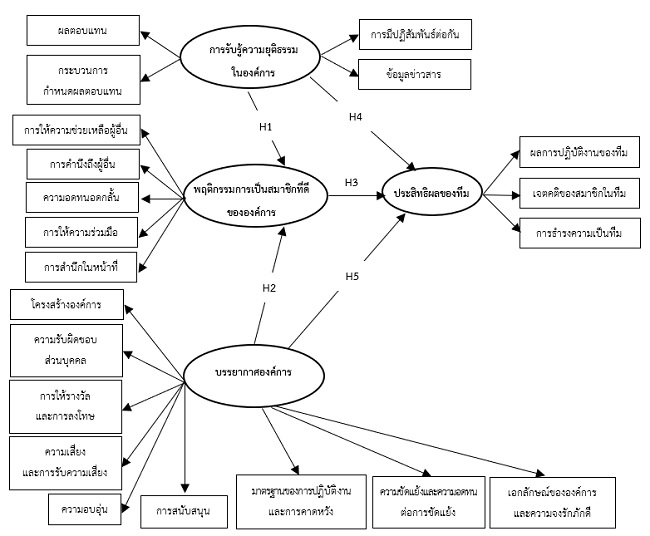THE INFLUENCE OF ORGANIZATIONAL JUSTICE PERCEPTION, ORGANIZATIONAL CLIMATE AND ORGANIZATIONAL CITIZENSHIP BEHAVIOR ON TEAM EFFECTIVENESS OF OPERATIONAL LEVEL WORKERS IN LAEM CHABANG PORT, CHON BURI PROVINCE
DOI:
https://doi.org/10.14456/nrru-rdi.2022.17Keywords:
Organizational justice perception, Organizational climate, Organizational citizenship behavior, Team effectivenessAbstract
The purpose of this research was to study the influences of organizational justice perception, organizational climate and organizational citizenship behavior on team effectiveness of operational level workers in Laem Chabang Port, Chon Buri province. Quantitative research was used in this study. The samples were 215 operational level workers in Laem Chabang Port. A questionnaire was utilized as a research instrument. The data was gathered from operational level workers by stratified random sampling. The statistics used in data analysis consisted of frequency, percentage, skewness, kurtosis, Pearson correlation, confirmatory factor analysis and structural equation modeling (SEM). The results of the study revealed that the proposed model was consistent with the empirical data with relative chi-square=1.637, CFI=0.974, RMR=0.013, and RMSEA=0.055. The organizational climate had a significant positive direct effect on team effectiveness (DE=0.432, p<0.01) and the organizational climate also had a significant positive indirect effect on team effectiveness through organizational citizenship behavior (IE=0.375, p<0.01). The organizational citizenship behavior had a significant positive direct effect on team effectiveness (DE=0.505, p<0.01), whereas the organizational justice perception had no statistically significant direct or indirect effect on team effectiveness. The organizational justice perception, organizational climate and organizational citizenship behavior jointly accounted for 67.80% of the total variance in team effectiveness of the workers.
References
Badu, C. A., & Asumeng, M. (2013). Perceived Organizational Justice and Employees’ Organizational Citizenship Behaviour in Ghana. European Journal of Business and Management, 5(19), 144-150.
Boontham, S. (2015). Organizational Climate, Organizational Citizenship Behavior and Job Satisfaction: A Case Study of Sampran Riverside Hotel. Individual Research, Master of Arts in Industrial and Organization Psychology, Thammasat University, Bangkok. (In Thai)
Brown, W. B., & Moberg, D. J. (1980). Organization Theory and Management : A Macro Approach. New York : John Wiley and Sons.
Caroline, A., & Rousseau, V. (2011). Interpersonal Aggression and Team Effectiveness: The Mediating Role of Team Goal Commitment. Journal of Occupational and Organizational Psychology, 84(3), 565-580.
Chaimongkol, N., Chienwattanasook, K., Jaivong, C., Tanaseerungkool, K., & Chomjareon, S. (2018). The Influence of Organizational Citizenship Behavior and Team Effectiveness on Performance of Employees. Journal of Management Science Nakhon Pathom Rajabhat University, 5(1), 173-168. (In Thai)
Charoensomboonnithi, W. (2015). A study of Influences of an Organizational Justice and a Perceived Organizational on Organizational Citizenship Behavior, with Consideration of Work Quality. Thesis, Master of Arts in Industrial and Organization Psychology, Thammasat University, Bangkok. (In Thai)
Colquitt, J. A., Conlon, D. E., Wesson, M. J., Porter, C. O. L. H., & Ng, K. Y. (2001). Justice at the Millennium: A Meta-analytic Review of 25 years of Organizational Justice Research. Journal of Applied Psychology, 86(3), 425-445.
Cortina, J. M. (1993). What Is Coefficient Alpha? An Examination of Theory and Applications. Journal of Applied Psychology, 78(1), 98-104.
Curran, P. J., West, S. G., & Finch, J. F. (1996). The Robustness of Test Statistics to Non-normality and Specification Error in Confirmatory Factor Analysis. Psychological Methods, 1(1), 16-29.
Gaviria-Rivera, J. I., & López-Zapata, E. (2019). Transformational Leadership, Organizational Climate and Job Satisfaction in Work Teams. European Research Studies Journal, 22(3), 68-82.
Greenberg, J. (1990). Organizational Justice: Yesterday, Today, and Tomorrow. Journal of Management, 16(2), 399-432.
Kline, R. B. (2005). Principles and Practice of Structural Equation Modeling (2nd ed.). New York : Guilford Press.
Litwin, G. H., & Stringer, R. A. (1968). Motivation and Organizational Climate. Boston : Graduate School of Business Administration, Harvard University.
Mahembe, B., & Engelbrecht, A. S. (2014). The Relationship between Servant Leadership, Organisational Citizenship Behaviour and Team Effectiveness. SA Journal of Industrial Psychology, 40(1), 1-10.
McShane, S. L., & Von Glinow, M. A. (2005). Organizational Behavior : Emerging Realities for the Workplace Revolution. Boston, London : McGraw-Hill Irwin.
Organ, D. W. (1988). Organizational Citizenship Behaviour The Good Soldier Syndrome. Lexington, Mass : Lexington Book.
Parksarn, N., & Sansook, J. (2016). The Influence of Organizational Climate and the Organization Justice on Job Effectiveness of Vocational Education Commission in Phra Nakhon Si Ayutthaya. MUT Journal of Business Administration, 13(1), 43-65. (In Thai)
Rovinelli, R. J., & Hambleton, R. K. (1976). On the Use of Content Specialists in the Assessment of Criterion-Referenced Test Item Validity. Tijdschrift voor Onderwijs research, 2(2), 49-60.
Singh, S., & Singh, A. (2019). Interplay of Organizational Justice, Psychological Empowerment, Organizational Citizenship Behavior, and Job Satisfaction in the Context of Circular Economy. Management Decision, 57(4), 937-952.
Spector, P. E. (1996). Industrial and Organizational Psychology: Research and Practice. New York : John Wiley & Sons.
Subramani, A. K., Jan, N. A., Gaur, M., & Vinodh, N. (2015). Impact of Organizational Climate on Organizational Citizenship Behaviour with Respect to Automotive Industries at Ambattur Industrial estate, Chennai. IJABER, 13(8), 6391-6408.
Weston, R., & Gore, P. A., Jr. (2006). A Brief Guide to Structural Equation Modeling. The Counseling Psychologist, 34(5), 719-751.
Yeatts, D. E., & Hyten, C. (1998). High-Performing Self-Managed Work Teams: A Comparison of Theory to Practice. Thousand Oaks, CA: Sage.

Downloads
Published
How to Cite
Issue
Section
License

This work is licensed under a Creative Commons Attribution-NonCommercial-NoDerivatives 4.0 International License.




